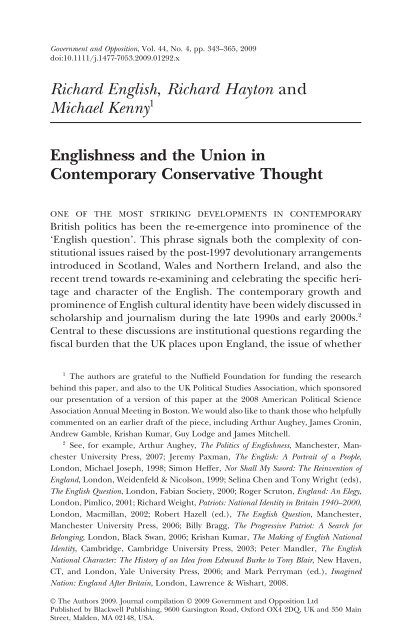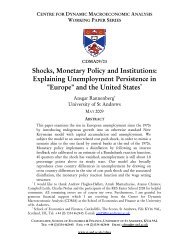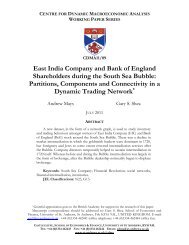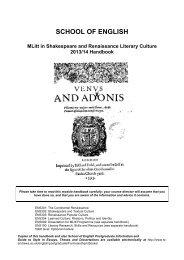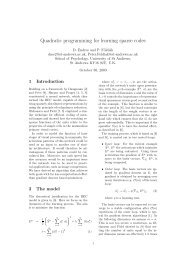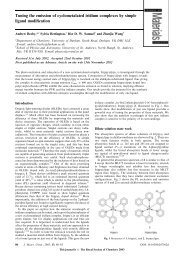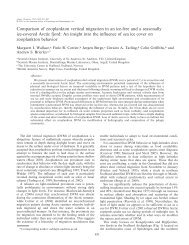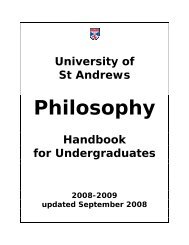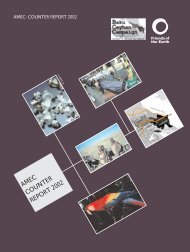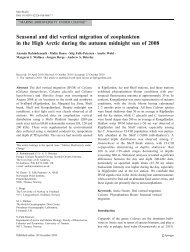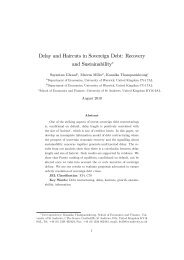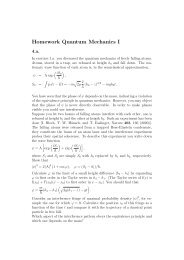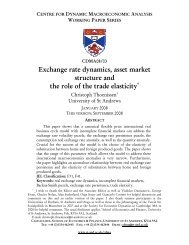Richard English, Richard Hayton and Michael Kenny1 Englishness ...
Richard English, Richard Hayton and Michael Kenny1 Englishness ...
Richard English, Richard Hayton and Michael Kenny1 Englishness ...
Create successful ePaper yourself
Turn your PDF publications into a flip-book with our unique Google optimized e-Paper software.
Government <strong>and</strong> Opposition, Vol. 44, No. 4, pp. 343–365, 2009<br />
doi:10.1111/j.1477-7053.2009.01292.x<br />
<strong>Richard</strong> <strong>English</strong>, <strong>Richard</strong> <strong>Hayton</strong> <strong>and</strong><br />
<strong>Michael</strong> Kenny 1<br />
<strong>English</strong>ness <strong>and</strong> the Union in<br />
Contemporary Conservative Thoughtgoop_1292 343..365<br />
ONE OF THE MOST STRIKING DEVELOPMENTS IN CONTEMPORARY<br />
British politics has been the re-emergence into prominence of the<br />
‘<strong>English</strong> question’. This phrase signals both the complexity of constitutional<br />
issues raised by the post-1997 devolutionary arrangements<br />
introduced in Scotl<strong>and</strong>, Wales <strong>and</strong> Northern Irel<strong>and</strong>, <strong>and</strong> also the<br />
recent trend towards re-examining <strong>and</strong> celebrating the specific heritage<br />
<strong>and</strong> character of the <strong>English</strong>. The contemporary growth <strong>and</strong><br />
prominence of <strong>English</strong> cultural identity have been widely discussed in<br />
scholarship <strong>and</strong> journalism during the late 1990s <strong>and</strong> early 2000s. 2<br />
Central to these discussions are institutional questions regarding the<br />
fiscal burden that the UK places upon Engl<strong>and</strong>, the issue of whether<br />
1 The authors are grateful to the Nuffield Foundation for funding the research<br />
behind this paper, <strong>and</strong> also to the UK Political Studies Association, which sponsored<br />
our presentation of a version of this paper at the 2008 American Political Science<br />
Association Annual Meeting in Boston. We would also like to thank those who helpfully<br />
commented on an earlier draft of the piece, including Arthur Aughey, James Cronin,<br />
Andrew Gamble, Krishan Kumar, Guy Lodge <strong>and</strong> James Mitchell.<br />
2 See, for example, Arthur Aughey, The Politics of <strong>English</strong>ness, Manchester, Manchester<br />
University Press, 2007; Jeremy Paxman, The <strong>English</strong>: A Portrait of a People,<br />
London, <strong>Michael</strong> Joseph, 1998; Simon Heffer, Nor Shall My Sword: The Reinvention of<br />
Engl<strong>and</strong>, London, Weidenfeld & Nicolson, 1999; Selina Chen <strong>and</strong> Tony Wright (eds),<br />
The <strong>English</strong> Question, London, Fabian Society, 2000; Roger Scruton, Engl<strong>and</strong>: An Elegy,<br />
London, Pimlico, 2001; <strong>Richard</strong> Weight, Patriots: National Identity in Britain 1940–2000,<br />
London, Macmillan, 2002; Robert Hazell (ed.), The <strong>English</strong> Question, Manchester,<br />
Manchester University Press, 2006; Billy Bragg, The Progressive Patriot: A Search for<br />
Belonging, London, Black Swan, 2006; Krishan Kumar, The Making of <strong>English</strong> National<br />
Identity, Cambridge, Cambridge University Press, 2003; Peter M<strong>and</strong>ler, The <strong>English</strong><br />
National Character: The History of an Idea from Edmund Burke to Tony Blair, New Haven,<br />
CT, <strong>and</strong> London, Yale University Press, 2006; <strong>and</strong> Mark Perryman (ed.), Imagined<br />
Nation: Engl<strong>and</strong> After Britain, London, Lawrence & Wishart, 2008.<br />
© The Authors 2009. Journal compilation © 2009 Government <strong>and</strong> Opposition Ltd<br />
Published by Blackwell Publishing, 9600 Garsington Road, Oxford OX4 2DQ, UK <strong>and</strong> 350 Main<br />
Street, Malden, MA 02148, USA.
344 GOVERNMENT AND OPPOSITION<br />
or not devolution represents a step towards an independent Scotl<strong>and</strong>,<br />
<strong>and</strong> the matter of whether the multination UK state has a viable<br />
future in the context of pressures towards further European integration.<br />
For conservatives, these interwoven cultural <strong>and</strong> institutional<br />
dimensions of the <strong>English</strong> question pose difficult challenges. The<br />
right might be considered the natural home for many who reassert<br />
a distinctively <strong>English</strong> cultural, national pride; yet conservatives<br />
have traditionally defined themselves according to a broader British<br />
patriotism <strong>and</strong> an attachment to revered institutions, such as Crown<br />
<strong>and</strong> Parliament, which have transcended <strong>English</strong>ness. 3<br />
In this article, we examine the arguments of three commentators<br />
associated with the political right – Simon Heffer, Peter Hitchens <strong>and</strong><br />
Roger Scruton – with a view to illuminating the different paths that<br />
conservative thinking has taken in relation to the <strong>English</strong> question<br />
<strong>and</strong> the contemporary Union. The three figures under scrutiny have<br />
been chosen for several reasons. Their arguments reflect the diversity<br />
of conservative responses to the <strong>English</strong> (<strong>and</strong> British) question, <strong>and</strong><br />
the deep divisions present on the political right within such debates.<br />
Their writings on the relation between <strong>English</strong>ness <strong>and</strong> Britishness<br />
have been presented to a broad set of audiences: this forces recognition<br />
that the discomfort caused by the <strong>English</strong>–British question<br />
extends far beyond the academic intellectual or party political<br />
realms. These three figures’ varying concerns <strong>and</strong> arguments provide<br />
clarifying lenses through which to read very important political<br />
subjects – subjects sometimes obscured from academic debate<br />
because of too narrow a focus on party political or intra-academic<br />
positions. Furthermore, this analysis can be located in relation to a<br />
broader field of academic inquiry into the degree to which intellectual<br />
thinking has changed during recent decades in Britain. 4<br />
Heffer <strong>and</strong> Hitchens fit conventional notions of what constitutes<br />
an ‘intellectual’ in the loosest sense only, although a case can certainly<br />
be made for Roger Scruton being considered as one. 5 But<br />
3 Philip Norton, ‘The Constitution’, in Kevin Hickson (ed.), The Political Thought<br />
of the Conservative Party Since 1945, Basingstoke, Palgrave Macmillan, 2005, p. 93.<br />
4 Julia Stapleton, Political Identities <strong>and</strong> Public Intellectuals in Britain since 1850,<br />
Manchester, Manchester University Press, 2001, p. 189.<br />
5 He certainly fits the definition developed in a major recent study of intellectuals<br />
in Britain: Stefan Collini, Absent Minds: Intellectuals in Modern Britain, Oxford, Oxford<br />
University Press, 2007.<br />
© The Authors 2009. Journal compilation © 2009 Government <strong>and</strong> Opposition Ltd
ENGLISHNESS AND THE UNION<br />
even as opinionated members of the ‘commentariat’, Heffer <strong>and</strong><br />
Hitchens are illustrative of broader trends <strong>and</strong> developments in<br />
national intellectual culture <strong>and</strong> conservative thinking in particular.<br />
Heffer has authored a well-regarded biographical study of Enoch<br />
Powell. 6 He <strong>and</strong> Hitchens are also authors of widely read books about<br />
national identity <strong>and</strong> public morality that are addressed at a broad<br />
reading public. 7 They are important shapers of opinion on the political<br />
right. Our assessment of them does not turn upon any assumption<br />
about their decisive political or academic influence, but aims to<br />
demonstrate that their thinking deserves serious critical scrutiny<br />
because of their salience <strong>and</strong> popular resonance in an area of<br />
profound political significance.<br />
SIMON HEFFER: TORY ENGLISHNESS<br />
345<br />
Prominent among those influentially engaging with the re-emergent<br />
<strong>English</strong> question is the leading right-wing commentator Simon<br />
Heffer, who has expressed his disaffection regarding post-1997 devolution<br />
in typically crisp terms:<br />
No one had said, ‘Do you want an <strong>English</strong> Parliament?’ No one had said, ‘Do<br />
you want a special forum in which <strong>English</strong>ness can be a big part of the debate<br />
<strong>and</strong> could be the sole consideration?’ That didn’t happen. ...Ifelt not just<br />
that I was being denied an identity. I felt that I was being denied proper<br />
participation in what was now a reconstituted democracy of these isl<strong>and</strong>s.<br />
That the Scots had a Parliament <strong>and</strong> they sent people to Westminster to<br />
interfere in our domestic arrangements; <strong>and</strong> the Welsh had an Assembly –<br />
ditto. I realized I didn’t mind not having a say in what was happening in<br />
Scotl<strong>and</strong>, but there had to be a quid pro quo for that, <strong>and</strong> that meant that the<br />
Scots didn’t have a say in what went on here. 8<br />
Part of Heffer’s argument here relies on an <strong>English</strong> pride <strong>and</strong><br />
confidence, based in turn on a recognition that <strong>English</strong>ness is the<br />
dominant strain within Britain: ‘<strong>English</strong>ness is probably, should be,<br />
6 Simon Heffer, Like the Roman: The Life of Enoch Powell, London, Weidenfeld &<br />
Nicolson, 1998.<br />
7 Heffer, Nor Shall My Sword; Peter Hitchens, The Abolition of Britain: From Winston<br />
Churchill to Princess Diana, London, Quartet Books, 2000.<br />
8 Simon Heffer, interviewed by <strong>Richard</strong> <strong>English</strong> <strong>and</strong> <strong>Michael</strong> Kenny, London, 5<br />
March 2007. See also Simon Heffer, ‘A Tory Answer to the West Lothian Question’,<br />
Daily Telegraph, 30 November 2005.<br />
© The Authors 2009. Journal compilation © 2009 Government <strong>and</strong> Opposition Ltd
346 GOVERNMENT AND OPPOSITION<br />
85 percent of Britishness’. 9 But an important aspect of Heffer’s own<br />
argument lies in the very personalized form of cultural awakening in<br />
which he has been involved since the later 1990s:<br />
I became interested in this question in the summer of 1996. I’m not interested<br />
at all in football, but that was the year when Engl<strong>and</strong> was supposed<br />
to win some sort of European Championship [Euro ’96]. And I suddenly<br />
noticed as I went around Engl<strong>and</strong>, particularly around the South East, the<br />
flag of St. George, which I had only seen in my lifetime on church towers, was<br />
suddenly appearing all over the place as a badge. And a lot of people felt very<br />
uneasy about this, <strong>and</strong> I realized that they associated <strong>English</strong>ness with oppression.<br />
Because we are the majority people in these isl<strong>and</strong>s – I think we are 85<br />
percent of the population of Great Britain <strong>and</strong> Northern Irel<strong>and</strong> – because<br />
of that we are forced as <strong>English</strong> people into a constant position of defensiveness<br />
about the way we have allegedly imposed our will <strong>and</strong> our values on<br />
everybody else. And when I started to talk to people – friends of mine who<br />
are interested in football, who underst<strong>and</strong> football – a lot of them said, ‘You<br />
know, it’s not just that we want the <strong>English</strong> football team to win. It’s that if you<br />
think about our friends who are Scottish or Welsh . . . they seem to have no<br />
problem in being Scottish or Welsh. But we have a bit of a problem in being<br />
<strong>English</strong>, or thinking of ourselves as <strong>English</strong>.’ And I suddenly realized –Ihad<br />
a sort of Kierkegaardian revelation – that actually my identity as a citizen was<br />
not a British identity: it was an <strong>English</strong> identity. And I am very <strong>English</strong>. My<br />
family is <strong>English</strong> on both sides as far back as you can go ...Ibegan to realize<br />
that I was very <strong>English</strong>. 10<br />
Such a position inevitably influences Heffer’s attitude towards the<br />
broader cultural shape of Britain: ‘We are not a multicultural society.<br />
We are a monocultural one tolerant of other cultures.’ 11 It is also<br />
self-evidently based on a profoundly historical conception of <strong>English</strong><br />
culture <strong>and</strong> identity. In particular, Heffer has drawn heavily in his<br />
writings on cultural portraits, for example in his study of the ‘deliberately’<br />
<strong>English</strong> composer Ralph Vaughan Williams – a study that<br />
presents its subject explicitly as a cultural nationalist, <strong>and</strong> which<br />
9 Heffer, interviewed by <strong>English</strong> <strong>and</strong> Kenny. Scholarly opinion reinforces such a<br />
view. The <strong>English</strong>, observes Krishan Kumar, ‘always remained the dominant group in<br />
the making <strong>and</strong> the maintenance of the empire (as of the United Kingdom). Hence<br />
they could think of it, rightly or wrongly, as “their” empire – or, at least, they could take<br />
pride in what they could consider a predominantly <strong>English</strong> creation, in the sense that<br />
it was mainly <strong>English</strong> culture that was spread worldwide through the empire’ (Krishan<br />
Kumar to <strong>Richard</strong> <strong>Hayton</strong> <strong>and</strong> <strong>Michael</strong> Kenny, April 2007). Cf. ‘The other British<br />
nations clung to their national identities as a kind of compensation for, or counterweight<br />
against, the predominant role of the <strong>English</strong> in the United Kingdom’ (Kumar,<br />
The Making of <strong>English</strong> National Identity, p. 187).<br />
10 Heffer, interviewed by <strong>English</strong> <strong>and</strong> Kenny.<br />
11 Simon Heffer, ‘Britain is an Old Country <strong>and</strong> our Ways Deserve Respect’, Daily<br />
Telegraph, 7 June 2006.<br />
© The Authors 2009. Journal compilation © 2009 Government <strong>and</strong> Opposition Ltd
ENGLISHNESS AND THE UNION<br />
347<br />
emphasizes the importance of the cultural dimensions of <strong>English</strong>ness,<br />
whether Anglican Protestantism, folk song, rural l<strong>and</strong>scape,<br />
history or heritage. 12 Heffer has also made significant contributions<br />
to the scholarly underst<strong>and</strong>ing of modern conservative thinking<br />
<strong>and</strong> British elite culture. 13 Such interventions have helped him<br />
provide an historical inflection to the anti-liberal hostility of the<br />
right-wing newspapers for which he writes. And, for Heffer, national<br />
decline can be directly linked to the spread of liberal orthodoxies:<br />
‘The seeds of Britain’s decline were propagated in Engl<strong>and</strong>, not least<br />
by <strong>English</strong> liberals of the twentieth century ...whose guilt complexes<br />
<strong>and</strong> underdeveloped thought processes brought a welfare state <strong>and</strong><br />
numerous other forms of crippling self-indulgence’. 14<br />
As a well-known right-wing political journalist <strong>and</strong> polemicist, 15<br />
Heffer has repeatedly expressed profound disaffection with the direction<br />
pursued by the Conservative Party leadership since Margaret<br />
Thatcher’s resignation as prime minister, <strong>and</strong> it is in this context that<br />
his arguments about <strong>English</strong>ness <strong>and</strong> Britishness are especially revealing.<br />
For Heffer’s assertions have at times been stark in relation to the<br />
UK, as with his comments in 2007 concerning the end of the Union:<br />
‘The Union is over, morally at least. When Scotl<strong>and</strong> voted for devolution<br />
in 1997 the Union fell into a coma ...Engl<strong>and</strong> <strong>and</strong> Scotl<strong>and</strong><br />
will only ever be happy together if they are politically apart.’ 16<br />
Heffer first made his call to break the Union in 1999, eloquently<br />
stated in Nor Shall My Sword – an attempt to rouse the <strong>English</strong> from<br />
their slumbers, <strong>and</strong> to accentuate a newly rising tide of <strong>English</strong>ness.<br />
Heffer is adamant that the revival of the latter is integrally connected<br />
to, <strong>and</strong> perhaps propelled by, the likelihood of further radical<br />
constitutional change. He therefore provides a forceful justification<br />
12 Simon Heffer, Vaughan Williams, Boston, Northeastern University Press, 2001,<br />
pp. 1, 7, 16, 23, 30–1, 65, 98, 143, 148.<br />
13 Simon Heffer, Moral Desperado: A Life of Thomas Carlyle, London, Weidenfeld &<br />
Nicolson, 1995; Simon Heffer, Power <strong>and</strong> Place: The Political Consequences of King Edward<br />
VII, London, Weidenfeld & Nicolson, 1998; Heffer, Like the Roman.<br />
14 Heffer, Nor Shall My Sword, p.52.<br />
15 He joined the Daily Telegraph in 1986, <strong>and</strong> then was appointed in 1991 as deputy<br />
editor <strong>and</strong> political correspondent of the Spectator. He subsequently became a columnist<br />
for both the Evening St<strong>and</strong>ard <strong>and</strong> the Daily Mail. From 1994–5 he became deputy<br />
editoroftheDaily Telegraph <strong>and</strong> one of its leading columnists.<br />
16 Simon Heffer, ‘End the Pretence: The Union of Engl<strong>and</strong> <strong>and</strong> Scotl<strong>and</strong> is Over’,<br />
Daily Telegraph, 14 November 2007.<br />
© The Authors 2009. Journal compilation © 2009 Government <strong>and</strong> Opposition Ltd
348 GOVERNMENT AND OPPOSITION<br />
for a programme of cultural Anglicization, in preparation for such an<br />
eventuality. In one sense, he expresses contemporary conservative<br />
hostility to the devolutionist constitutional arrangements established<br />
by post-1997 Labour administrations. But he also embodies a striking<br />
departure from traditional conservative positions in his argument<br />
that the break-up of the Union is both inevitable <strong>and</strong>, in various<br />
respects, necessary for Engl<strong>and</strong>’s revival.<br />
Nor Shall My Sword argues that Engl<strong>and</strong> represents a perfectly<br />
viable independent territorial <strong>and</strong> political entity. Throughout the<br />
book Heffer bewails various blocks to the recognition of this fact, <strong>and</strong><br />
outlines the mental reconfiguration that is required for those who<br />
inhabit Engl<strong>and</strong> to embrace <strong>and</strong> deepen their cultural (<strong>and</strong> indeed<br />
ethnic) sense of <strong>English</strong>ness. Frustratingly for him, ‘many in Engl<strong>and</strong><br />
instinctively persist in the notion that the <strong>English</strong> nation would in<br />
some sense be inadequate alone’, <strong>and</strong> he seeks to disabuse them of<br />
this deep-seated notion. 17 Consequently the Union of Engl<strong>and</strong> with<br />
Scotl<strong>and</strong>, Wales <strong>and</strong> Northern Irel<strong>and</strong> – a Union that has for so long<br />
been seen by its critics as a bulwark for <strong>English</strong> hegemony, <strong>and</strong> for<br />
Engl<strong>and</strong>’s values <strong>and</strong> interests – is strikingly re-presented here as<br />
the source of the latter’s problems. Rather than fearing the demise<br />
of Britain, the <strong>English</strong> should wake up to this prospect <strong>and</strong> embrace<br />
the possibilities it presents. However, for Engl<strong>and</strong> to work as a<br />
political society <strong>and</strong> sovereign territorial state, there needs to be a<br />
conscious attempt to promote <strong>and</strong> deepen a sense of pride <strong>and</strong><br />
self-consciousness among its people.<br />
PETER HITCHENS: THE BRITISH DEMISE<br />
A very different br<strong>and</strong> of right-wing argument concerning <strong>English</strong>ness,<br />
Britishness <strong>and</strong> the UK has been propounded in forthright<br />
terms by the writer <strong>and</strong> broadcaster Peter Hitchens. 18 In his newspaper<br />
columns <strong>and</strong> books in recent years, Hitchens has been preoccupied<br />
with what he considers the profound decline of morality in<br />
modern Britain. He reads this as a phenomenon of huge importance<br />
during the past half-century, but one with much older origins:<br />
17 Heffer, Nor Shall My Sword, p.57.<br />
18 For many years a regular columnist at the Daily Express, Hitchens currently writes<br />
for the Mail on Sunday <strong>and</strong> appears frequently on the broadcast media.<br />
© The Authors 2009. Journal compilation © 2009 Government <strong>and</strong> Opposition Ltd
ENGLISHNESS AND THE UNION<br />
349<br />
I think it has its roots in the religious doubts of the nineteenth century which<br />
spread from the intellectual <strong>and</strong> university-educated classes to become much<br />
more widespread, <strong>and</strong> of course which were enormously increased by the<br />
First World War, which destroyed almost everybody’s faith in almost everything<br />
they had believed in before. And when people don’t have an ethic<br />
that they can believe in that restrains them, or gives them any reason to<br />
restrain themselves from self-centred behaviour, then self-centred behaviour<br />
becomes more common. 19<br />
According to Hitchens, moral decay lies at the heart of the processes<br />
shaping Britain’s more general demise. In a widely publicized<br />
polemic against the modernization of cultural <strong>and</strong> social life, he<br />
pinpoints ‘a deep shift in the way the British people view themselves,<br />
their past <strong>and</strong> their future. Fewer each day now consider themselves<br />
to be British.’ 20 There are echoes here of some scholarly arguments of<br />
recent years, about broad trends in popular opinion <strong>and</strong> national<br />
self-underst<strong>and</strong>ing. 21 But Hitchens’s argument has a particularly disaffected<br />
<strong>and</strong> polemical tone. He contrasts the fading of the imperial<br />
age (symbolized by the funeral of Winston Churchill) with an event<br />
that he takes to be emblematic of all the mistaken modernity of<br />
contemporary cultural life (the ersatz public mourning for Diana,<br />
Princess of Wales).<br />
Unlike Simon Heffer, Hitchens laments the fact that the future of<br />
Britishness appears gloomy: ‘It grows increasingly difficult to see how<br />
Britishness could be saved. Nonetheless, I think that it’s important<br />
that we should regret its passing.’ Why? Because the identities of the<br />
constituent nations of the UK prosper best together:<br />
They’re complementary parts of the same organism, <strong>and</strong> Britain has been<br />
severely lacking in certain important qualities since the Republic of Irel<strong>and</strong><br />
broke away, <strong>and</strong> particularly since the European Union made what had up<br />
until then been a symbolic departure a real departure, <strong>and</strong> it is a loss. I also<br />
think that the highpoint of this country’s political development took place<br />
when the two isl<strong>and</strong>s were entirely united. 22<br />
This clearly has significance for conservative politics itself. ‘I think<br />
conservatism is Unionist or it is nothing ...Once the Conservatives<br />
19 Peter Hitchens, interviewed by <strong>Richard</strong> <strong>English</strong> <strong>and</strong> <strong>Michael</strong> Kenny, London,<br />
5 March 2007.<br />
20 Hitchens, The Abolition of Britain, p.v.<br />
21 Weight, Patriots, pp. 1, 10; Arthur Aughey, Nationalism, Devolution <strong>and</strong> the<br />
Challenge to the United Kingdom State, London, Pluto Press, 2001, p. vii.<br />
22 Hitchens, interviewed by <strong>English</strong> <strong>and</strong> Kenny.<br />
© The Authors 2009. Journal compilation © 2009 Government <strong>and</strong> Opposition Ltd
350 GOVERNMENT AND OPPOSITION<br />
ceased to be a powerful Unionist force in Scotl<strong>and</strong>, they became<br />
irrelevant, likewise in Wales ...Butalso I just think that Scotl<strong>and</strong>,<br />
Wales <strong>and</strong> Irel<strong>and</strong> bring important things to the country.’ 23 So, again<br />
in contrast to Heffer, Hitchens is uneasy about the renewed emphasis<br />
upon the distinct nations <strong>and</strong> national identities that co-exist within<br />
Britain: he regards the turn towards the ‘narrower loyalties of the<br />
UK’s smaller nations’ as entirely regrettable. 24 Simultaneously,<br />
however, he slips unselfconsciously between references to Britain<br />
<strong>and</strong> <strong>English</strong> values when propounding his nostalgic account of the<br />
nation’s lost heritage. In his mind, emphasis upon Engl<strong>and</strong> is merely<br />
one more unfortunate instance of the profound transformation in<br />
the national self-underst<strong>and</strong>ings <strong>and</strong> moral character of the peoples<br />
who inhabit Britain. 25<br />
There is no doubting Hitchens’s reluctance to enthuse over a<br />
resurgent sense of <strong>English</strong> pride as such. Of <strong>English</strong>ness itself, he<br />
comments:<br />
Well, I feel it <strong>and</strong> to some extent also I fear it, because it’s more exclusive.<br />
Britishness, by being multi-national, is actually accessible. An immigrant<br />
person can come here <strong>and</strong> become British . . . <strong>English</strong>ness – you’ve either<br />
got it or you haven’t got it, it seems to me. It’s more exclusive. I think there’s<br />
a danger that in encouraging <strong>English</strong>ness, you encourage nationalism rather<br />
than patriotism. 26<br />
Is it his view that <strong>English</strong>ness possesses a more chauvinistic<br />
dimension? ‘Well, it has that capacity because it’s visceral, whereas<br />
Britishness is more thoughtful, it seems to me. Britishness contains<br />
everything that <strong>English</strong>ness contains.’ 27<br />
There is an unshakeable air of gloom about Hitchens’s analysis, as<br />
he laments growing criminality <strong>and</strong> moral permissiveness alike. 28 He<br />
seems determined to be a Cass<strong>and</strong>ra-like figure: a prophet of disaster<br />
whom readers enjoy hearing without necessarily heeding. His declinist<br />
stance shows no particular hope of redemptive recovery, given<br />
his totalizing critique of the state of the current Conservative Party<br />
<strong>and</strong> his deeply pessimistic analysis of contemporary political morality.<br />
23 Ibid.<br />
24 Hitchens, Abolition of Britain, p.xxii.<br />
25 Ibid., p. vi.<br />
26 Hitchens, interviewed by <strong>English</strong> <strong>and</strong> Kenny.<br />
27 Ibid.<br />
28 Peter Hitchens, A Brief History of Crime: The Decline of Order, Justice <strong>and</strong> Liberty in<br />
Engl<strong>and</strong>, London, Atlantic Books, 2003.<br />
© The Authors 2009. Journal compilation © 2009 Government <strong>and</strong> Opposition Ltd
ENGLISHNESS AND THE UNION<br />
However, Hitchens does fit a familiar pattern of declinist writers<br />
on the politics of nationhood, 29 his fears for contemporary Britain<br />
reflecting an exceptionalist view of <strong>English</strong>/British development<br />
drenched with longing for a return to a lost golden age, <strong>and</strong> infused<br />
with the fear that the trajectory of social change is moving inexorably<br />
away from a traditionally defined morality.<br />
Hitchens is in some ways an atypical figure: an idiosyncratic<br />
blend of former Trotskyite, British patriot, rural romantic <strong>and</strong><br />
1950s moralist (his support for the conservative moral orthodoxies<br />
of yesteryear, including capital <strong>and</strong> corporal punishment, make him<br />
a favourite of TV <strong>and</strong> radio producers). Yet he can also be placed<br />
within the cantankerous family of anti-liberal declinist commentators,<br />
an assembly of figures who throughout the twentieth century<br />
have proclaimed the demise of the nation. Not untypically among<br />
such commentators, he despairs of nearly all the conventional remedies<br />
offered for the social problems he dissects in garish detail. 30<br />
ROGER SCRUTON: AN ELEGY FOR ENGLISHNESS<br />
351<br />
Roger Scruton is one of Engl<strong>and</strong>’s most prominent public intellectuals.<br />
31 A central theme within his scholarly <strong>and</strong> public writings has<br />
been the cultural basis <strong>and</strong> political character of <strong>English</strong>ness. He is<br />
sceptical about the cultural state of Britishness (‘things had moved on<br />
so much that the whole concept of Britain had been thrown into<br />
disarray. It had become quite apparent that there is no such cultural<br />
entity any more’ 32 ); but his thoughtful writings on <strong>English</strong>ness reflect<br />
a dual sense that this is both a phenomenon worthy of celebration,<br />
<strong>and</strong> also one which has now been substantially destroyed: hence his<br />
elegiac portrait. 33<br />
29 <strong>Richard</strong> <strong>English</strong> <strong>and</strong> <strong>Michael</strong> Kenny, ‘Public Intellectuals <strong>and</strong> the Question of<br />
British Decline’, British Journal of Politics <strong>and</strong> International Relations, 3 (2001), pp. 259–83.<br />
30 For an analysis of this genre, see <strong>English</strong> <strong>and</strong> Kenny, ‘Public Intellectuals’,<br />
pp. 270–6.<br />
31 Born in 1944, Scruton was formerly a professor at Birkbeck College, London;<br />
but he has established his position as a leading philosopher in t<strong>and</strong>em with the roles<br />
of novelist <strong>and</strong> composer, while his frequent BBC appearances have reflected <strong>and</strong><br />
reinforced his commitment to wide-ranging cultural <strong>and</strong> political comment.<br />
32 Roger Scruton, interviewed by <strong>Richard</strong> <strong>English</strong> <strong>and</strong> <strong>Richard</strong> <strong>Hayton</strong>, London,<br />
25 June 2008.<br />
33 Scruton, Engl<strong>and</strong>: An Elegy.<br />
© The Authors 2009. Journal compilation © 2009 Government <strong>and</strong> Opposition Ltd
352 GOVERNMENT AND OPPOSITION<br />
An attachment to the idea of Engl<strong>and</strong> has always been at the<br />
heart of <strong>English</strong>/British conservatism. As Scruton commented, ‘I<br />
don’t think you can be a conservative in the end without being some<br />
kind of nationalist. You are always going to have in the back of your<br />
mind a conception of the community whose structure you are trying<br />
to retain.’ 34 Scruton’s conservative philosophy draws upon Burke,<br />
Hegel, Oakeshott <strong>and</strong> Hayek, rejecting universalism <strong>and</strong> preferring<br />
instead a politics based on human instinct. In a Burkean compact<br />
between the living, the dead <strong>and</strong> the unborn, trust is placed in our<br />
collective inheritance, particularly in the form of societal organizations,<br />
practices <strong>and</strong> traditions, the law <strong>and</strong> the constitution. A sense<br />
of place <strong>and</strong> territorial loyalty is therefore central to identity. For<br />
Scruton, that place <strong>and</strong> identity is Engl<strong>and</strong>, which is ‘shared not as<br />
a reality so much as an ideal which constantly impacts on reality’. 35<br />
Central to this ideal is the countryside, which has defined the<br />
<strong>English</strong> sense of home <strong>and</strong> belonging. Scruton eulogizes this lost idyll<br />
<strong>and</strong> bemoans the commensurate erosion of identity, but also detects<br />
pockets of resistance: ‘rumours of the death of the countryside are<br />
exaggerated, but it is certainly changing in character <strong>and</strong> there are<br />
lots <strong>and</strong> lots of pressures on it’. 36 Echoing Heffer <strong>and</strong> Hitchens, he<br />
argues that some of Engl<strong>and</strong>’s worst enemies can be found within –<br />
namely the liberal left <strong>and</strong> the Labour Party. New Labour, he comments,<br />
‘inherits from Old Labour an anti-<strong>English</strong> stance’, epitomized<br />
by the ban on fox-hunting. As he commented on the ban:<br />
Primarily it was regarded as a way of attacking the old <strong>English</strong> settlement, on<br />
the underst<strong>and</strong>ing that fox-hunting is first of all an <strong>English</strong> pursuit; secondly<br />
that it is absolutely integral to the country way of life; <strong>and</strong> thirdly largely<br />
supported by the upper class. You can put together a picture which makes it<br />
a target of those kinds of attitude. But the very reason that it was a target<br />
suggests that indeed the <strong>English</strong> are not that dead – why should people target<br />
something that doesn’t exist? 37<br />
Immigration has similarly been used ‘as a foil against the <strong>English</strong><br />
by their enemies’, particularly by ‘the Ken Livingstone types who live<br />
in a culture of repudiation towards the <strong>English</strong> idea’. Immigration,<br />
Scruton argues, ‘provides them with a very interesting way of<br />
34 Roger Scruton, interviewed by <strong>Richard</strong> <strong>English</strong> <strong>and</strong> <strong>Richard</strong> <strong>Hayton</strong>, London,<br />
25 June 2008.<br />
35 Ibid.<br />
36 Ibid.<br />
37 Ibid.<br />
© The Authors 2009. Journal compilation © 2009 Government <strong>and</strong> Opposition Ltd
ENGLISHNESS AND THE UNION<br />
delegitimizing Engl<strong>and</strong>: the idea that it should be multicultural not<br />
monocultural, <strong>and</strong> it’s not because of the intrinsic racism of the<br />
<strong>English</strong>’. The cultural shift wrought by immigration has played an<br />
important part in undermining the viability of his cherished vision<br />
of Engl<strong>and</strong>. Yet it also has had a role in heightening awareness of<br />
the idea: ‘as people have been waking up to the problems of a large<br />
Islamic minority it has become even more in people’s minds that<br />
this is not something that is easily reconcilable with our inherited<br />
way of doing things’. The political process of devolution is also<br />
central to the growing public sense of <strong>English</strong>ness, even though it<br />
too constitutes a harmful assault. Behind the politics of devolution,<br />
Scruton argues, ‘there was also a whole culture of devolution’ based<br />
on Celtic resentment. ‘That process I think awoke people to the<br />
idea of Engl<strong>and</strong>, for how do we explain this political process without<br />
this idea?’ 38<br />
The effect of devolution is to lay bare the interdependent relationship<br />
between <strong>English</strong>ness <strong>and</strong> Britishness. Differing markedly from a<br />
tendency in academic analysis to emphasize the accommodating <strong>and</strong><br />
underdeveloped character of <strong>English</strong>ness in relation to the British<br />
imperial ideal, 39 Scruton argues that Britishness <strong>and</strong> the empire were<br />
ultimately projections of a prior sense of <strong>English</strong>ness:<br />
I think under the British Empire it wasn’t so much that <strong>English</strong>ness got<br />
replaced by Britishness, but that it got adopted by other people – in particular<br />
by the Northern Irish, <strong>and</strong> by the Scots <strong>and</strong> the Welsh too. The<br />
imperial enterprise brought them all under the same banner, very much<br />
like the idea of Rome in the Roman Empire. It wasn’t a multicultural idea<br />
at all, it was a monocultural ideal, focused on the imperial city <strong>and</strong> the<br />
culture that prevailed there. I think that is one of the misunderst<strong>and</strong>ings,<br />
partly due to the domination of the discussion of all of this by people on<br />
the left. The anti-imperial impetus behind it has led people not to see that<br />
actually empires offer something to the people that join them, namely an<br />
identity that they might not otherwise have had, <strong>and</strong> that identity, I think,<br />
was Engl<strong>and</strong>. 40<br />
Britishness cannot therefore contain the multiple nationalisms of<br />
the <strong>English</strong> <strong>and</strong> revanchist Celts, making the prospect of an accommodation<br />
of <strong>English</strong>ness within Britain almost impossible. Sovereignty<br />
has also been ceded to the European Union, to the extent<br />
that ‘the <strong>English</strong> are no longer a sovereign people, <strong>and</strong> their law is<br />
38 Ibid.<br />
39 For example Kumar, <strong>English</strong> National Identity.<br />
40 Scruton, interviewed by <strong>English</strong> <strong>and</strong> <strong>Hayton</strong>.<br />
353<br />
© The Authors 2009. Journal compilation © 2009 Government <strong>and</strong> Opposition Ltd
354 GOVERNMENT AND OPPOSITION<br />
no longer their own’. 41 Globalization <strong>and</strong> urbanization have subverted<br />
the established order in which locality defined allegiance.<br />
The cardinal place of the Church of Engl<strong>and</strong> – ‘the operative word<br />
there is not Church, but Engl<strong>and</strong>’ 42 – has withered; with it, the unity<br />
of nationality, religion <strong>and</strong> the <strong>English</strong> language has been lost.<br />
Sovereignty, unity, Anglicanism, countryside, locality, cultural<br />
gentleness, legal responsibility <strong>and</strong> freedom, parliamentary representation,<br />
serious culture: all have been eroded. So Scruton’s argument<br />
demonstrates the way in which discussion of <strong>English</strong>ness can<br />
become a vehicle for the expression of attachment to a broader set<br />
of conservative political values. In this respect, there are clear continuities<br />
between the styles of conservative argument of such figures<br />
as John Betjeman <strong>and</strong> Arthur Bryant in the inter-war years, <strong>and</strong> a<br />
figure such as Scruton. 43<br />
Scruton’s projection of Engl<strong>and</strong> does not sit easily with his<br />
defence of the nation-state more generally. He has the problem –<br />
perhaps generic to the new Anglo-conservatism – that positing an<br />
independent culture of <strong>English</strong>ness <strong>and</strong> calling for a new political<br />
settlement in the United Kingdom invariably means a radical adjustment<br />
of the constitutional order associated with the unitary British<br />
state, which has remained a fixity within conservative thinking for<br />
well over a century. Scruton needs to locate <strong>and</strong> defend a plausible<br />
distinction between what is <strong>English</strong> <strong>and</strong> what is British, both culturally<br />
<strong>and</strong> in terms of state architecture. His frequent invocations<br />
of the Irish-born Burke <strong>and</strong> Wilde, in order to exemplify some<br />
deeply <strong>English</strong> characteristic, hints tellingly at this problem. Similarly,<br />
while the Westminster Parliament is in Engl<strong>and</strong>, it was – <strong>and</strong><br />
indeed remains –aUKrather than an <strong>English</strong> institution. Again<br />
<strong>and</strong> again, the phenomena celebrated by Scruton as key components<br />
of <strong>English</strong>ness turn out to possess a clear British dimension.<br />
Scruton’s dream of detaching a pristine <strong>English</strong> culture from<br />
British traditions <strong>and</strong> its other national cultures ultimately founders<br />
upon the historical complexity shaping the relationship between<br />
Engl<strong>and</strong> <strong>and</strong> Britain.<br />
41 Scruton, Engl<strong>and</strong>: An Elegy, p. 251.<br />
42 Scruton, interviewed by <strong>English</strong> <strong>and</strong> <strong>Hayton</strong>.<br />
43 Julia Stapleton, ‘Cultural Conservatism <strong>and</strong> the Public Intellectual in Britain,<br />
1930–70’, European Legacy, 5 (2000), pp. 795–814.<br />
© The Authors 2009. Journal compilation © 2009 Government <strong>and</strong> Opposition Ltd
ENGLISHNESS AND THE UNION<br />
CONTEMPORARY CONSERVATISM AND THE UNION<br />
355<br />
Four main points emerge from consideration of Heffer’s, Hitchens’s<br />
<strong>and</strong> Scruton’s arguments about <strong>English</strong>ness <strong>and</strong> Britishness. First,<br />
their sustained, highly visible <strong>and</strong> resonant engagement with this<br />
complex problem highlights <strong>and</strong> reinforces its growing significance<br />
in UK politics: the disaffection of many with Engl<strong>and</strong>’s place in a<br />
reconfigured Union, <strong>and</strong> the particular difficulty this causes for those<br />
on the traditionally Unionist right. Opinion poll evidence attests<br />
to the existence of popular disaffection, 44 but the arguments of<br />
the three commentators under scrutiny in this article illuminate its<br />
complex texture <strong>and</strong> the diverse nature of responses on the right.<br />
Asymmetrical devolution has brought with it renewed controversy<br />
about the West Lothian question, <strong>and</strong> also about the differential sums<br />
of public money spent in the constituent parts of the UK. 45 For<br />
conservatives, in particular, the fraying of a traditionally harmonious<br />
<strong>English</strong>/British relationship has been disconcerting, threatening to<br />
unravel the underst<strong>and</strong>ing of the state upon which their political<br />
thinking has traditionally been based.<br />
As the self-proclaimed national party, the Conservative Party has<br />
traditionally defended the Union <strong>and</strong> opposed devolution, as ‘for<br />
much of the last three centuries, belief in nation was synonymous<br />
with a belief in the Union’. 46 The patriotic Britishness with which<br />
Conservatives identified ‘drew heavily upon <strong>English</strong> traditions,<br />
notably the principle of parliamentary sovereignty <strong>and</strong> a Whig history<br />
of progress <strong>and</strong> exceptionalism, plus the values <strong>and</strong> interests of an<br />
Anglicized elite’. 47 Now, as the model of a sovereign unitary state <strong>and</strong><br />
a monocultural society wanes, the Conservatives face a conundrum.<br />
Confronted with cultural <strong>and</strong> constitutional challenges, should they<br />
seek to extricate <strong>English</strong> identity from a Britishness with which they<br />
have traditionally associated, thereby damaging the Union that<br />
44 See John Curtice, Where St<strong>and</strong>s the Union Now? London, Institute for Public Policy<br />
Research, 2008.<br />
45 See Iain McLean, Guy Lodge <strong>and</strong> Katie Schmuecker, Fair Shares? Barnett <strong>and</strong><br />
the Politics of Public Expenditure, London, Institute for Public Policy Research, 2008.<br />
46 Simon Heffer, ‘Traditional Toryism’, in Hickson, The Political Thought of the<br />
Conservative Party Since 1945, p. 200.<br />
47 Philip Lynch, The Politics of Nationhood: Sovereignty, Britishness <strong>and</strong> Conservative<br />
Politics, Basingstoke, Macmillan, 1999, p. 2.<br />
© The Authors 2009. Journal compilation © 2009 Government <strong>and</strong> Opposition Ltd
356 GOVERNMENT AND OPPOSITION<br />
they for so long sought to defend? Or should they aim to preserve an<br />
asymmetrical Union <strong>and</strong> risk being positioned as the opponent of<br />
a rising current of <strong>English</strong> populism? Here, the answers offered by<br />
Heffer, Hitchens <strong>and</strong> Scruton vary, demonstrating the diversity of<br />
right-wing reactions to this problem. Seen positively, this highlights<br />
the existence on the right of vibrant reflection upon a central<br />
problem; seen more negatively, it attests to the difficulty of finding<br />
shared ground in response to a genuine difficulty.<br />
Indeed, the second point to emerge from our analysis is that these<br />
very prominent commentators on the <strong>English</strong>–British relationship<br />
are more effective at articulating the nature of the problem, than at<br />
producing effective <strong>and</strong> practically influential remedies for it. Their<br />
arguments have only a limited purchase upon <strong>and</strong> influence over<br />
political power <strong>and</strong> policy. All three – <strong>and</strong> the arguments they<br />
espouse – currently occupy maverick positions even in relation to<br />
right-wing centres of power <strong>and</strong> policy-making authority. Neither<br />
Heffer’s populist <strong>English</strong> anti-Unionism, nor Hitchens’s enthusiastic<br />
Unionism <strong>and</strong> suspicion of <strong>English</strong> populism, nor Scruton’s Edwardian<br />
<strong>English</strong>ness, are anywhere near to the core of current Conservative<br />
Party politics. And, while some on the left have expressed<br />
anxiety that the Conservatives could play the <strong>English</strong> card to good<br />
effect, <strong>and</strong> that the party might channel <strong>English</strong> disaffection <strong>and</strong><br />
grievance, there are reasons for doubting that this will occur. For one<br />
thing, few mainstream figures have been keen to associate themselves<br />
with the politics of <strong>English</strong> resentment. 48 Some senior figures <strong>and</strong> a<br />
number of backbenchers may privately have aired more pronounced<br />
sentiments about the current position of Engl<strong>and</strong> within the Union,<br />
but they have had negligible impact on frontbench thinking as a<br />
whole. 49 The Conservative Party has been reluctant to engage seriously<br />
with proponents of an <strong>English</strong> Parliament, <strong>and</strong> the party leader,<br />
David Cameron, has been keen to emphasize his own Unionist credentials.<br />
50 For Cameron, the risks to his project to modernize the<br />
48 <strong>Michael</strong> Kenny, <strong>Richard</strong> <strong>English</strong> <strong>and</strong> <strong>Richard</strong> <strong>Hayton</strong>, Beyond the Constitution:<br />
<strong>English</strong>ness in a Post-Devolved Britain, London, Institute for Public Policy Research, 2008.<br />
49 Iain Dale, interviewed by <strong>Michael</strong> Kenny <strong>and</strong> Guy Lodge, London, 12 November<br />
2008.<br />
50 See David Cameron’s speech to the Scottish Conservatives, 23 May 2008;<br />
available at: http://www.conservatives.com/tile.do?def=webcameron.story.page&obj_<br />
id=144993&speeches=1<br />
© The Authors 2009. Journal compilation © 2009 Government <strong>and</strong> Opposition Ltd
ENGLISHNESS AND THE UNION<br />
357<br />
Conservative Party are clear: embracing a populist <strong>English</strong> nationalist<br />
position would run counter to his strategy of softening the party’s<br />
image <strong>and</strong> occupying the political centre-ground. 51 The shrill tone<br />
of Heffer’s high-cultural <strong>English</strong>ness, or the baleful lament of<br />
Scruton’s hardly fit the impression of a party at ease with contemporary<br />
British society that Cameron has sought to cultivate. Indeed,<br />
a good deal of the potential appeal of these arguments has drained<br />
away in the context first of the economic prosperity overseen by<br />
successive Labour administrations since 1997 <strong>and</strong>, latterly, following<br />
the political resurgence of the Tories.<br />
Moreover, after a decade of devolution <strong>and</strong> five decades of a<br />
declining vote share in Scotl<strong>and</strong>, what Scruton labelled the ‘emotional<br />
pull’ of Unionism remains strong. 52 For the former Conservative<br />
secretary of state for Scotl<strong>and</strong>, Sir Malcolm Rifkind, ‘the<br />
Conservative Party remains overwhelmingly a Unionist party, totally<br />
committed to the Union’. 53 According to this view, devolution does<br />
not represent an absolute transformation of relations between<br />
Engl<strong>and</strong> <strong>and</strong> Scotl<strong>and</strong>, as it is a misreading of history to assume that<br />
there was ever a pre-devolution situation in which the two nations<br />
were fully unified as one. As Rifkind highlights, the nature of the UK<br />
has always been diverse, with different legal <strong>and</strong> legislative requirements,<br />
different churches, <strong>and</strong> different education systems:<br />
As early as the 1880s, so different were the Scottish parliamentary <strong>and</strong> legislative<br />
requirements that the job of secretary of state for Scotl<strong>and</strong> had to be<br />
created to h<strong>and</strong>le the government’s business in Scotl<strong>and</strong>. So ever since the<br />
Act of Union, the Union was not as incorporating as is often assumed. There<br />
were institutional requirements because of the separate Scottish legal system,<br />
church <strong>and</strong> educational system. So devolution did not bring for the first time<br />
the need for separate Scottish legislation. The reason why it is much more<br />
controversial today is because it is much more visible today south of the<br />
border. 54<br />
Rifkind acknowledges that since devolution to Scotl<strong>and</strong>, <strong>English</strong>ness<br />
has re-emerged. He also recognizes that ‘the Labour Party has a<br />
51 <strong>Richard</strong> <strong>Hayton</strong>, ‘Conservative Party Leadership Strategy <strong>and</strong> the Legacy<br />
of Thatcherite Conservatism, 1997–2005’, unpublished PhD thesis, University of<br />
Sheffield, pp. 161–7.<br />
52 Scruton, interviewed by <strong>English</strong> <strong>and</strong> <strong>Hayton</strong>.<br />
53 Malcolm Rifkind, interviewed by <strong>Richard</strong> <strong>Hayton</strong> <strong>and</strong> <strong>Michael</strong> Kenny, 29 January<br />
2008.<br />
54 Ibid.<br />
© The Authors 2009. Journal compilation © 2009 Government <strong>and</strong> Opposition Ltd
358 GOVERNMENT AND OPPOSITION<br />
much greater party political interest in Scotl<strong>and</strong>, <strong>and</strong> the Tory Party<br />
has a much greater party political interest in Engl<strong>and</strong>. That’s simply<br />
where our strengths are.’ 55 However, the debate within the party over<br />
how to respond the West Lothian question, including Rifkind’s own<br />
proposals for an <strong>English</strong> Gr<strong>and</strong> Committee, has largely been conducted<br />
within a discourse aimed at preserving the Union, with the<br />
objective being to stem rather than to exploit <strong>English</strong> resentment<br />
about the asymmetries of devolution.<br />
Again, the Conservative policy objective expressed by the chair of<br />
David Cameron’s recent Democracy Taskforce, Kenneth Clarke, to<br />
devise ‘some sensible constitutional minor change, in my opinion, to<br />
finish the business of devolution’ <strong>and</strong> tackle the ‘niggle that sometimes<br />
<strong>English</strong> matters are settled against the majority votes of the<br />
<strong>English</strong> MPs’, 56 seems to be more attuned to the mainstream of<br />
public sentiment than the polemics of our three commentators. The<br />
sometimes-feverish talk of Heffer, Hitchens <strong>and</strong> Scruton fails to resonate<br />
to a sufficient degree with even Conservatives among the <strong>English</strong><br />
electorate, <strong>and</strong> so a radical policy shift seems unlikely. According to<br />
the analysis of various polling data conducted by the psephologist<br />
John Curtice, there has been no dramatic or continuous shift in<br />
popular feeling towards a sense of <strong>English</strong>ness at the expense of Britishness<br />
in the last decade. A small shift did occur in the wake of the<br />
changes associated with devolution, but no further significant change<br />
in grassroots sentiment can, he argues, be detected from available<br />
data. 57<br />
Indeed, a third point emerging from our case studies is one that<br />
helps to explain the difficulty there would be for <strong>English</strong> separatists<br />
to gain political momentum or practical change: the fact that <strong>English</strong>ness<br />
<strong>and</strong> Britishness are so incredibly difficult to disentangle culturally<br />
<strong>and</strong> historically in any credible fashion. This near-impossibility<br />
55 Ibid.<br />
56 HC 75, Devolution: A Decade On, Minutes of Evidence, Justice Committee, Session<br />
2007/08, London, Stationery Office, 2008.<br />
57 This finding is in marked contrast to the results of a smattering of commercial<br />
polls over the last few years that report dramatic movements of opinion in favour of, for<br />
instance, an <strong>English</strong> Parliament. Such results, he argues, are very probably the product<br />
of the nature of the questions posed by these organizations; see John Curtice, ‘Has<br />
Engl<strong>and</strong> Had Enough? Public Opinion <strong>and</strong> the Future of the Union’, London,<br />
NatCen, 2008.<br />
© The Authors 2009. Journal compilation © 2009 Government <strong>and</strong> Opposition Ltd
of decoupling <strong>English</strong>ness from Britishness represents an acute<br />
problem for Heffer <strong>and</strong> Scruton. Even such articulate advocates as<br />
these of a historically rooted <strong>English</strong> cultural case have acknowledged<br />
that much of what they draw upon is British, rather than merely<br />
<strong>English</strong>. Both Scruton58 <strong>and</strong> Heffer have conceded this problem of<br />
the cultural complexity of identity:<br />
Britishness is common to all of us <strong>and</strong> has a mixture of <strong>English</strong>ness. By the<br />
same token, much of what we regard as <strong>English</strong>ness borrows from mainstream<br />
western Christian European culture as well. When I walk around<br />
Engl<strong>and</strong> <strong>and</strong> see our cathedrals, I’m reminded very much of those in France.<br />
If you go to the cathedral in Bordeaux, for example, it could be in any<br />
<strong>English</strong> cathedral town you want. Our language borrows heavily, obviously<br />
from German, also from Latin <strong>and</strong> from French. So none of these cultures is,<br />
if you like, compartmentalized. They all borrow from somewhere else. And<br />
that’s what makes it so hard to talk about what is the difference between<br />
‘<strong>English</strong>ness’ <strong>and</strong> ‘Britishness’. 59<br />
This problem has long historical roots. As Robert Colls demonstrates,<br />
<strong>English</strong>ness until the mid-nineteenth century provided the<br />
dominant register through which a sense of British nationhood was<br />
expressed – even in non-<strong>English</strong> regions. 60 The very fact of Engl<strong>and</strong>’s<br />
long-st<strong>and</strong>ing hegemony in terms of the British state <strong>and</strong> its wider<br />
culture hampers current conservative attempts to locate <strong>and</strong> disseminate<br />
a pure <strong>English</strong>ness. ‘Engl<strong>and</strong>’ requires an active (<strong>and</strong> ideological)<br />
process of ‘invention’, not a straightforward act of historical<br />
recovery.<br />
Fourth, the sense of crisis implicit within these figures’ declinist<br />
arguments is out of kilter with the majority of popular sentiment.<br />
It is far from clear that the moral breakdown identified by Peter<br />
Hitchens has impacted in any significant way on contemporary<br />
politics, <strong>and</strong> his concerns are, in this sense, sectional <strong>and</strong> sometimes<br />
idiosyncratic (for instance his support for capital <strong>and</strong> corporal<br />
punishment). His gloomy assessment links the passing of the imperial<br />
age with a declining sense of Britishness <strong>and</strong> – his greatest<br />
concern – the moral degeneration of the nation. 61 But the apocalyptic<br />
manner in which he frames his anxieties, for example his worry<br />
that <strong>English</strong> identity has been tarred by the ‘mobs of fat, beery men’<br />
58 Scruton, Engl<strong>and</strong>: An Elegy, pp. 201, 204.<br />
59 Heffer, interviewed by <strong>English</strong> <strong>and</strong> Kenny.<br />
60 Robert Colls, Identity of Engl<strong>and</strong>, Oxford, Oxford University Press, 2002.<br />
61 Hitchens, Abolition of Britain.<br />
ENGLISHNESS AND THE UNION<br />
359<br />
© The Authors 2009. Journal compilation © 2009 Government <strong>and</strong> Opposition Ltd
360 GOVERNMENT AND OPPOSITION<br />
who wave St George’s flags at Engl<strong>and</strong> football matches, 62 closes him<br />
off from political influence even when a discourse of social breakdown<br />
<strong>and</strong> concern about violence <strong>and</strong> moral decline have become<br />
central to political debate. On the broader ‘crisis’ of British identity,<br />
again there are reasons for doubting that the problem is sufficiently<br />
grave to necessitate the kind of dramatic reordering of politics<br />
sought by someone like Simon Heffer. Even within the community of<br />
opinion around the Daily Telegraph, he is far from uniformly reflective<br />
of opinion. For a pro-UK, pro-Britain line runs alongside his own<br />
<strong>and</strong> is reflected in the paper’s editorial position: ‘We should make<br />
the contemporary case for Britain as a cultural, economic <strong>and</strong> military<br />
force for good’. 63<br />
It might be true that the notion of a comfortably consensual<br />
Britishness faces serious problems. But it might also be argued that<br />
anxiety about a supposed crisis of Britishness involves an exaggeration<br />
of actual threats, <strong>and</strong> that such anxiety might be read as a further<br />
symptom of the declinist mentality which the British political elite<br />
has tended to adopt since the late 1960s, rather than a reflection of<br />
pervasive <strong>and</strong> urgent popular opinion. 64 Put another way, given that<br />
<strong>English</strong> concerns <strong>and</strong> interests clearly dominate the agenda of the<br />
UK Parliament, will most <strong>English</strong> people simply fail to be sufficiently<br />
bothered about the kind of issues so important to Simon Heffer<br />
<strong>and</strong> Roger Scruton? Will inertia <strong>and</strong> a disinclination to deal with<br />
the complexities <strong>and</strong> challenges that disentangling the Union would<br />
involve inhibit <strong>English</strong> nationalism? In answer to the question,<br />
‘Where does Engl<strong>and</strong> fit into the reconfiguration of Britain?’ 65 it<br />
is possible to argue that the realities of <strong>English</strong> size <strong>and</strong> economic<br />
centrality take the heat out of the supposed <strong>English</strong> problem in<br />
relation to Britishness. As Andrew Marr has pointed out:<br />
We have to start with the question of scale. Engl<strong>and</strong> overwhelms Scotl<strong>and</strong><br />
<strong>and</strong> Wales as much today as in the past. Thus, whatever ‘<strong>English</strong>ness’ is, it will<br />
prove to be surprisingly similar to Britishness – the British oak with branches<br />
62 Peter Hitchens, ‘Why I Can’t Wait for it to be All Over for Engl<strong>and</strong>’, Mail on<br />
Sunday, 2 June 2002.<br />
63 Iain Martin, ‘Ending the Union Would Cost Britain Dear’, Daily Telegraph, 15<br />
November 2007.<br />
64 <strong>Richard</strong> <strong>English</strong> <strong>and</strong> <strong>Michael</strong> Kenny (eds), Rethinking British Decline, Basingstoke,<br />
Macmillan, 2000.<br />
65 Tony Wright, ‘Engl<strong>and</strong>, Whose Engl<strong>and</strong>?’, in Chen <strong>and</strong> Wright, The <strong>English</strong><br />
Question, p.7.<br />
© The Authors 2009. Journal compilation © 2009 Government <strong>and</strong> Opposition Ltd
ENGLISHNESS AND THE UNION<br />
361<br />
lopped off, not a new tree. The biggest challenges to the traditional notion<br />
of <strong>English</strong> identity, as with British identity, are not from within the UK. Just<br />
as the creation of the Irish Free State had virtually no impact on British<br />
identity, so Scottish independence, should it happen, will have little impact<br />
on <strong>English</strong> identity. Nor has the arrival of the EU in British affairs touched<br />
identity, as opposed to the constitution, nearly as strongly as many observers<br />
suggested it would ...No,thebigger challenges are globalization, particularly<br />
as experienced through global br<strong>and</strong>s, <strong>and</strong> through immigration, <strong>and</strong><br />
also Americanized culture. 66<br />
Indeed, despite the declinist concerns variously articulated by<br />
Heffer, Hitchens <strong>and</strong> Scruton, there might yet remain more life<br />
in the Union than is sometimes assumed. As Arthur Aughey has<br />
expressed it, ‘The existence of nationalism has never predetermined<br />
its victory over multinational Britishness’. 67 Indeed, the lesson of the<br />
most sharp-edged recent battle of all between separatist nationalism<br />
<strong>and</strong> Britishness – that witnessed in Northern Irel<strong>and</strong> during the past<br />
40 years – itself rather points in this direction. Scottish, Welsh <strong>and</strong><br />
<strong>English</strong> separatism have not begun to approach the violence, organization<br />
or commitment of the anti-UK campaign waged in the past<br />
generation by Irish Republicans who sought that the six counties<br />
of Northern Irel<strong>and</strong> should be removed from the UK. But even this<br />
most famous, durable, aggressive <strong>and</strong> formidable anti-UK nationalism<br />
has now, it appears, settled for something well short of separatism.<br />
The Belfast Agreement of 1998 <strong>and</strong> subsequent political<br />
arrangements have seen Irish Republicans accept for the foreseeable<br />
future a reformed Northern Irel<strong>and</strong> within the UK, rather than<br />
secession from it. 68 Moreover, nowhere in the UK was Britishness<br />
more dependent than among Ulster Unionists upon monarchy, Protestantism,<br />
industrialism <strong>and</strong> empire. Yet the decline of each of these<br />
elements of British identity has caused not the ending of Ulster<br />
Unionist Britishness, but rather its reformulation in different but<br />
equally committed form. There are no inevitable lessons here for the<br />
rest of the UK, but the Northern Irish case certainly does not point<br />
to any inevitable disintegration of Britishness, or any imminent death<br />
of the UK.<br />
Might there be a broader, suggestive pattern here? Again,<br />
Aughey’s observations are pertinent: ‘That one sort of Britain is<br />
66 Andrew Marr to <strong>Richard</strong> <strong>English</strong>, 4 July 2007.<br />
67 Aughey, Nationalism, p.17.<br />
68 <strong>Richard</strong> <strong>English</strong>, Armed Struggle: The History of the IRA, London, Macmillan, 2003,<br />
pp. 285–389.<br />
© The Authors 2009. Journal compilation © 2009 Government <strong>and</strong> Opposition Ltd
362 GOVERNMENT AND OPPOSITION<br />
dead, the Britain of the Raj, cannot be doubted. That does not mean,<br />
necessarily, the death of Britain itself.’ 69 And James Mitchell’s<br />
authoritative recent study of UK devolution has concluded that ‘ever<br />
looser union’, rather than the end of the Union, seems a reasonable<br />
prediction. 70 So if there is to be a serious redefinition of Conservative<br />
Party politics in relation to national identity, then the challenge<br />
might yet be one of redefining a more relevant Britishness, rather<br />
than opting for political or cultural <strong>English</strong> separatism. This suggests<br />
that neither Heffer’s separatist hopes, nor Scruton’s lament, nor<br />
Hitchens’s gloom might quite be fully justified.<br />
National challenges to Britishness from within are, of course, very<br />
old. But again this perhaps suggests British resilience rather than<br />
fragility. <strong>Richard</strong> Weight acknowledges the practical ties that hold the<br />
constituent parts of the UK together, <strong>and</strong> counter-balance nationalist<br />
forces. 71 In Scotl<strong>and</strong> there was historically a profound engagement<br />
with British Empire, <strong>and</strong> an economically based enthusiasm for the<br />
Union. 72 But neither the end of empire nor subsequent economic<br />
dynamics have necessarily turned Scottish opinion decisively against<br />
membership of the UK. 73 Indeed, while emotional attachment to the<br />
UK may have declined, opinion over the economic benefits is largely<br />
more positive. Andrew Gamble has highlighted how for Gordon<br />
Brown the need to compete successfully in the global economy is a<br />
central justification for his Unionism. 74 This was epitomized by his<br />
claim that the government’s moves to recapitalize the banking sector<br />
(including the two major Scottish banks) were only possible because<br />
of the strength of the Union. 75<br />
69 Aughey, Nationalism, p.48.<br />
70 James Mitchell, Devolution in the UK, Manchester, Manchester University Press,<br />
2009, pp. 225–6.<br />
71 Weight, Patriots, p. 730.<br />
72 Tom M. Devine, ‘The Break-Up of Britain? Scotl<strong>and</strong> <strong>and</strong> the End of Empire’,<br />
Transactions of the Royal Historical Society, 16 (2006), pp. 163–80.<br />
73 Tom Nairn, After Britain: New Labour <strong>and</strong> the Return of Scotl<strong>and</strong>, London, Granta<br />
Books, 2000.<br />
74 Andrew Gamble, ‘Gordon Brown <strong>and</strong> the Reinvention of Britishness’, paper<br />
presented to the American Political Science Association Annual Meeting, Boston, 29<br />
August 2008.<br />
75 Gerri Peev, ‘Brown: Banking Crisis Has Proved Case for Union’, Scotsman, 15<br />
October 2008, at http://heritage.scotsman.com/labourparty/Brown-Banking-crisishas-proved.4591680.jp<br />
© The Authors 2009. Journal compilation © 2009 Government <strong>and</strong> Opposition Ltd
CONCLUSION<br />
ENGLISHNESS AND THE UNION<br />
Julia Stapleton has recently pointed out that, at least since the latter<br />
part of the nineteenth century, there have been significant advocates<br />
of Engl<strong>and</strong> <strong>and</strong> <strong>English</strong>ness as distinct from Britain <strong>and</strong> Britishness,<br />
but that this advocacy has existed within a recognized context of the<br />
interdependence between Engl<strong>and</strong> <strong>and</strong> Britain. 76 The question of<br />
how dependent <strong>English</strong>ness is upon Britishness is an issue that has<br />
elicited disagreement in political circles for at least a century.<br />
The thinking of the figures considered here is distinctive in<br />
relation to this long-st<strong>and</strong>ing tradition in part because of its acute<br />
commitment to the idea of national decline. While this is a cause of<br />
lament for Hitchens, Heffer perceives current woes as an opportunity<br />
to reinvent <strong>and</strong> celebrate a deeper <strong>English</strong> identity, <strong>and</strong> to invigorate<br />
it with a political edge. For Scruton the crisis is not merely one of<br />
Britishness but of the <strong>English</strong>ness upon which it was built. As such,<br />
Hitchens’s notice of the abolition of Britain might seem misdirected<br />
– his story, Scruton argues, is ‘specifically <strong>English</strong>’. 77 Scruton wishes<br />
to mark the passing of ‘Old Engl<strong>and</strong>’, <strong>and</strong> his text has a deliberately<br />
elegiac quality. 78 He hopes his work ‘might have some long-term<br />
effect on the way people conceptualize Engl<strong>and</strong>’ but acknowledges<br />
that ‘it won’t have any immediate political impact’. 79 By contrast,<br />
Hitchens <strong>and</strong> Heffer strike an urgent tone <strong>and</strong> clamour for action,<br />
although where Heffer sees possibilities, the hope of national<br />
redemption for Hitchens is forlorn.<br />
Each of the authors examined here can be considered significant<br />
in their own right in this recent period, <strong>and</strong> have gained a hearing<br />
among a fairly broad public. A key source of this influence in the<br />
cases of Hitchens <strong>and</strong> Heffer stems from their position as key<br />
members of a high-profile b<strong>and</strong> of public commentators who form a<br />
caste of quasi-celebrity pundits in the London-based press. As such,<br />
they enjoy a stable <strong>and</strong> fairly determinate audience, though this is<br />
importantly supplemented by the activities of both in the right-wing<br />
76 Julia Stapleton, ‘Engl<strong>and</strong> <strong>and</strong> <strong>English</strong>ness’, in Matthew Flinders, Andrew<br />
Gamble, Colin Hay <strong>and</strong> <strong>Michael</strong> Kenny (eds), The Oxford H<strong>and</strong>book of British Politics,<br />
Oxford, Oxford University Press, forthcoming, 2009.<br />
77 Scruton, Engl<strong>and</strong>: An Elegy, p. 248.<br />
78 Ibid., p. viii.<br />
79 Scruton, interviewed by <strong>English</strong> <strong>and</strong> <strong>Hayton</strong>.<br />
363<br />
© The Authors 2009. Journal compilation © 2009 Government <strong>and</strong> Opposition Ltd
364 GOVERNMENT AND OPPOSITION<br />
blogosphere. Through books, newspaper writings <strong>and</strong> BBC appearances,<br />
Roger Scruton also comm<strong>and</strong>s frequent public attention.<br />
All three figures draw tellingly on established traditions of thinking,<br />
<strong>and</strong> in two of our cases, a particular intellectual figure, as a<br />
forgotten lodestar for contemporary conservatives. Thus, Heffer’s<br />
continuing attachment to the legacy of Enoch Powell, Scruton’s<br />
deployment of Edwardian ruralist images of (southern) Engl<strong>and</strong> <strong>and</strong><br />
Hitchens’s revival of nineteenth-century moralism are important<br />
indications of the degree to which current streams of conservative<br />
thinking still flow from long-established intellectual rivers. That they<br />
are all some way out of kilter with the policy thinking of the party’s<br />
current leadership is revealing of an emergent tension between the<br />
strategic imperatives being pursued by politicians of the right <strong>and</strong><br />
some of the party’s most powerful <strong>and</strong> established intellectual roots. 80<br />
Our argument suggests, above all, that conventional political<br />
analysis would do well to pay more heed to thinking <strong>and</strong> commentary<br />
that circulate on the margins of mainstream politics on touchstone<br />
issues of national identity, culture <strong>and</strong> history. This is not to exaggerate<br />
the impact of these figures. But it is certainly possible that our<br />
three writers do indeed signify a shifting mood in political argument,<br />
attachment <strong>and</strong> orientation. We need to assess the different audiences<br />
for whom such figures are writing, <strong>and</strong> give more weight<br />
to endeavours to shift the climate of opinion on such issues as ‘the<br />
<strong>English</strong> question’, as opposed to persuading frontbenchers of the<br />
merits of a particular policy. As we have suggested, these three commentators<br />
perhaps reflect <strong>and</strong> refract wider concerns about the relationship<br />
between <strong>English</strong>ness <strong>and</strong> Britishness, but without exerting<br />
particular political influence over policy, or resolving the problem for<br />
<strong>English</strong> enthusiasts that <strong>English</strong>ness is so interwoven with Britishness;<br />
moreover, in each case, there is arguably an exaggerated sense of<br />
crisis to the declinism so ably articulated. As opinionated columnists,<br />
book-writers <strong>and</strong> high-profile pundits, Heffer, Hitchens <strong>and</strong> Scruton<br />
have played an important role in challenging, shaping <strong>and</strong> outraging<br />
the communities of opinion that circulate around the Conservative<br />
Party. While they have had little impact on the policy debates animating<br />
the Tory frontbench on these issues, there is every possibility that<br />
Heffer <strong>and</strong> Scruton may be contributing to a changing mindset on<br />
80 For a fuller analysis of this tension see <strong>Michael</strong> Kenny, ‘Commentary: Taking the<br />
Temperature of the UK’s Political Elite’, Parliamentary Affairs, 62 (2009), pp. 149–61.<br />
© The Authors 2009. Journal compilation © 2009 Government <strong>and</strong> Opposition Ltd
ENGLISHNESS AND THE UNION<br />
365<br />
the centre right about the need to address Engl<strong>and</strong>’s political <strong>and</strong><br />
cultural position a decade after devolution. Questions about national<br />
identity, culture <strong>and</strong> mission continue to provide opportunities, it<br />
would seem, for intellectuals <strong>and</strong> commentators who are one step<br />
removed from the crucible of politics to gain a hearing <strong>and</strong> exert a<br />
degree of influence.<br />
© The Authors 2009. Journal compilation © 2009 Government <strong>and</strong> Opposition Ltd


